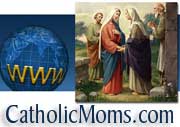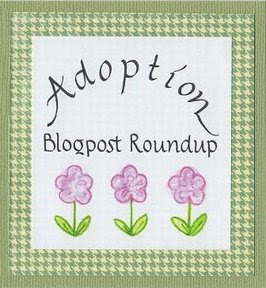
Tonight I received this note from "Lynn." She raises an important issue that I've encountered many times since I started writing about adoption. So many of these women are grieving -- deeply -- the loss of their children. Some feel as though they were coerced. Others simply wish they'd had the opportunity to parent.
The grief they feel is real. Patricia Dischler, in her book "Because I Loved You" explains that, for first/birth moms, making an adoption plan is one of the most painful experiences of her life. Even when that choice is the right one, for the sake of the child. And sadly, it seems that many of these women -- in their grief -- honestly believe that for those who cannot parent, abortion is a better choice. At the very least, they argue, the options are not abortion vs. adoption, but abortion vs. parenting. This woman is one such example.
I am a birthmom and I have met many others. Not one among us considered abortion and then chose adoption as an alternative. I understand that your motives for this argument are made for the sake of children but since abortion and adoption are mutually exclusive decisions, your argument does not have a very firm foundation. I'd be happy to hear more of your thoughts on the matter and hope you don't mind that I've shared mine. Thanks, Lynn.
Dear Lynn: Of course I don't mind hearing from you -- especially since you pose your ideas so respectfully.
In years past, the default decision for women in crisis pregnancies was adoption. Since the legalization of abortion, this trend has changed -- and millions of women and children have been hurt or killed in the process.
Abortion and adoption are "mutually exclusive" only because it is impossible to adopt a dead infant. If a woman who felt she was unable to parent (for example, the main character in the movie "Juno"), was encouraged to consider adoption instead, she would both save the child's life and prevent herself from suffering the long-term effects of post-abortion trauma. Making an adoption plan is not without its challenges -- but for women who feel they are unable to parent, it acknowledges the intrinsic value and dignity of the child without forcing a woman to bear the lifelong burden of knowing she had killed her child.
A lot of this is about education, about teaching our children that a life in the womb is indeed a human life, with the right to "life, liberty, and the pursuit of happiness," rather than a "blob of tissue." So many women have bought into the lie that the life inside them isn't really a child -- and the horrific reality hit them too late to save the child. (This is one of the most important differences between adoption and abortion: With abortion, the woman shies from making an adoption plan because she is afraid of the pain of losing her child; with abortion, the pain hits much later -- after it is too late to save the child.)
In this day and age, medical technology is capable of saving children -- performing surgeries and taking other lifesaving measures -- long before they are born. On the other hand, these children are killed -- legally -- while the only part of them that has yet to be delivered is part of their scalp. It's all very arbitrary -- and evil. When there are viable alternatives -- when there are so many families who are willing and able to care for these children, why on earth should these children not be given a chance to live?
Thanks for writing,
In years past, the default decision for women in crisis pregnancies was adoption. Since the legalization of abortion, this trend has changed -- and millions of women and children have been hurt or killed in the process.
Abortion and adoption are "mutually exclusive" only because it is impossible to adopt a dead infant. If a woman who felt she was unable to parent (for example, the main character in the movie "Juno"), was encouraged to consider adoption instead, she would both save the child's life and prevent herself from suffering the long-term effects of post-abortion trauma. Making an adoption plan is not without its challenges -- but for women who feel they are unable to parent, it acknowledges the intrinsic value and dignity of the child without forcing a woman to bear the lifelong burden of knowing she had killed her child.
A lot of this is about education, about teaching our children that a life in the womb is indeed a human life, with the right to "life, liberty, and the pursuit of happiness," rather than a "blob of tissue." So many women have bought into the lie that the life inside them isn't really a child -- and the horrific reality hit them too late to save the child. (This is one of the most important differences between adoption and abortion: With abortion, the woman shies from making an adoption plan because she is afraid of the pain of losing her child; with abortion, the pain hits much later -- after it is too late to save the child.)
In this day and age, medical technology is capable of saving children -- performing surgeries and taking other lifesaving measures -- long before they are born. On the other hand, these children are killed -- legally -- while the only part of them that has yet to be delivered is part of their scalp. It's all very arbitrary -- and evil. When there are viable alternatives -- when there are so many families who are willing and able to care for these children, why on earth should these children not be given a chance to live?
Thanks for writing,
















 My StumbleUpon Page
My StumbleUpon Page



 border="0">
border="0">















